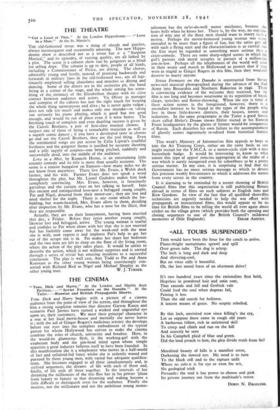THE THEATRE
" Get a Load of This." At the London Hippodrome.—" Love in a Mist." At the St. Martin's.
THE old-fashioned revue was a thing of shreds and patches, always inconsequent and occasionally amusing. The new Hippo-
drome show is described not as a revue but a> a " Surprise Musical," and its episodes, of varying quality, are all linked by a plot. The scene is a cabaret show run by gangsters as a blind
for selling dope. The cabaret is up to date, people of all kinds, including a Commissioner of Police, are dining. The chorus, admirably young and lovely, instead of prancing backwards and forwards in military lines in the old-fashioned way, are all legi- timately employed selling chocolates and matches or dining and dancing. Some of the diners are in the orchestra pit, the band being in a corner of the stage, and the whole setting has some- thing of the, intimacy of the Elizabethan theatre with its close contact between audience and actors. Vic Oliver as manager and compere of the cabaret has just the right touch for keeping the whole thing spontaneous and alive ; he is never quite vulgar ; does not talk too much- and makes only one mistake—in taking too seriously his piano playing, which is good but not good enough, and would be out of place even if it were better. The finishing touch of complete and even dazzling success is given by the Cairoli Brothers, a pair of first-class musical clowns. I suspect one of them of being a remarkable musician as well as a superb comic dancer ; if you have a developed taste in clowns go and see the Cairoli Brothers, they are the real thing. Even the sentimental songs are put across by Celia Lipton's youthful freshness and the gangster theme is justified by accurate shooting and a jolly supply of corpses—one being pitched, suddenly and successfully dead, into the middle of the audience.
Love in a Mist, by Kenneth Horne, is an entertaining little country comedy and its title is more than usually accurate. The scene is a remote bungalow on Exmoor—how many miles we do not know from anywhere. There live Mr. Evans, a Welsh duck farmer, and his wife. Farmer Evans does not speak a word throughout the play, but Mr. Lionel Gadsden makes him look completely convincing. Mrs. Evans, however, is ferociously garrulous and the curtain rises on her talking to herself. Into this ancient and extinguished love-nest a befogged young couple, Pat and Nigel, descend from their motor-car ; they are lost and need shelter for the night. There is one room which the for- bidding, but warm-hearted, Mrs. Evans allots to them, deciding after inspection by Mr. Evans, who has a nose for the illicit, that they are respectable.
Actually, they are on their honeymoon, having been married that day, a Friday. Before they retire another young couple, likewise lost and befogged, arrive. The young woman is tearful and confides to Pat when alone with her that she is not married but has foolishly come away for the week-end with the man she is with, now regrets it and implores Pat's help to get her out of the scrape she is in. Pat makes her share her bedroom and the two men are left to sleep on the floor of the living room, where the action of the play takes place. It would be unfair to describe the action, which is not without surprises and is carried through a series of trivial but amusing incidents to a successful conclusion. The play is well cast, Ann Todd as Pat and Anna Konstam as the other young woman being convincingly con- sorted with Richard Bird as Nigel and Michael Shepley as the


























 Previous page
Previous page